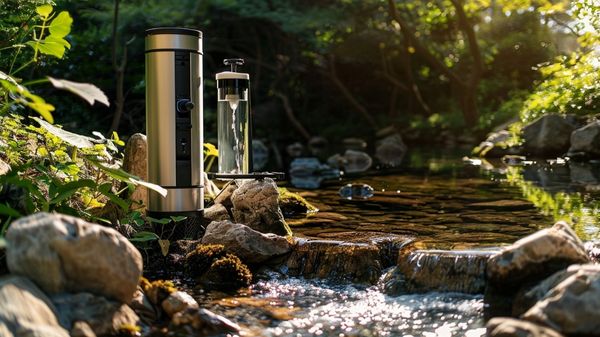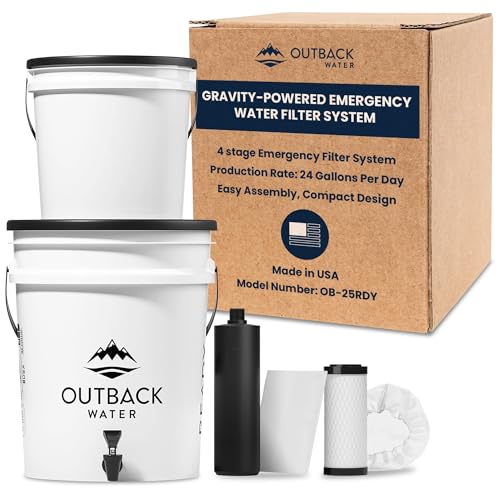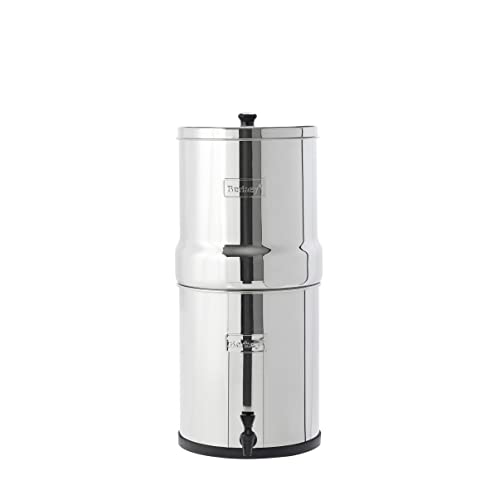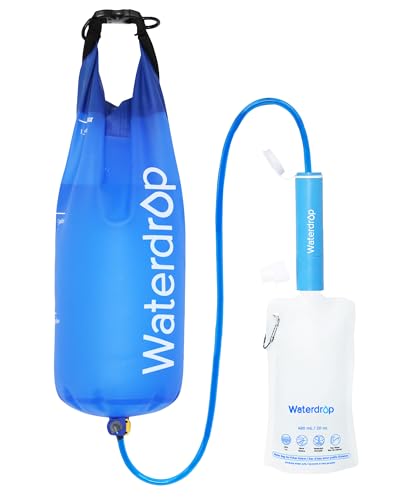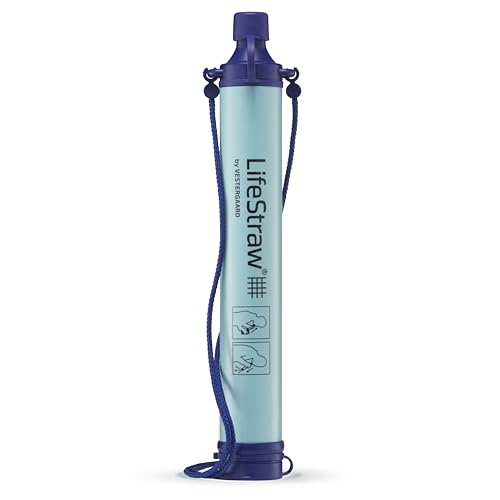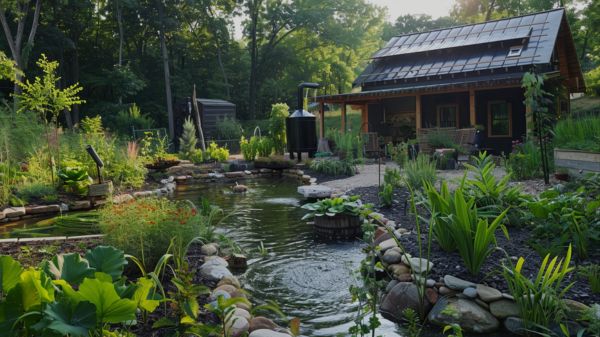To identify the best off-grid water filtration systems, you should consider options that utilize multi-stage filtration and UV purification for effective contaminant removal. Systems like Berkey® offer adaptable configurations for various water sources, including rainwater and surface water.
Gravity-fed models eliminate electricity dependency, ensuring reliability in remote areas, while advanced technologies enable you to maintain water quality safely. Regular maintenance, including filter replacements and system inspections, is essential for optimal performance.
Consulting detailed comparisons of DIY versus commercial solutions can further clarify your options, enhancing your understanding of effective off-grid water management strategies.
Understanding Off-Grid Water Filtration
Off-grid water filtration systems are vital for those looking to guarantee a reliable supply of clean water in remote areas. These systems tackle various filtration challenges, particularly when it comes to effective water sourcing.
By utilizing gravitational operation, off-grid systems, such as Berkey filters, operate independently from electricity and water pressure, making them particularly effective in isolated environments.
Most successful systems incorporate multi-stage filtration, which may include sediment removal and UV sterilization, thereby ensuring that a broader range of contaminants is eliminated. Additionally, the Berkey®️ filtration system provides unmatched adaptability for various conditions, enhancing its suitability for off-grid lifestyles.
However, maintaining these systems requires diligence; regular inspection for leaks, scheduled replacement of filtration components, and thorough cleaning of filter media are essential to their performance and longevity.
Monitoring the taste, odor, and flow rate of the water can signal when a replacement is necessary, while periodic water quality testing further guarantees safety and efficacy.
Types of Filtration Methods
When considering off-grid water filtration methods, it’s crucial to understand the effectiveness of boiling water and UV purification technologies.
Boiling water not only eradicates harmful bacteria and viruses through the application of heat, but it also serves as a practical option when other filtration systems are unavailable.
Meanwhile, UV purification systems, known for their efficiency, use ultraviolet light to target and destroy microorganisms without the need for any chemicals, making them both a safe and environmentally friendly choice for water treatment. Additionally, off-grid filter systems are vital for ensuring safe drinking water since natural sources are often contaminated with sediments and pathogens.
Boiling Water Benefits
Boiling water is a tried-and-true method for purifying drinking water, providing an effective means to eliminate harmful pathogens like bacteria and viruses. This technique is fundamental for guaranteeing water safety, especially in survival situations where access to clean water is limited.
Utilizing proper boiling techniques, you can make certain the water is treated effectively. Here are some essential benefits of boiling water:
- Effective Against Contaminants: Boiling eliminates bacteria, viruses, and parasites, making it one of the simplest methods for disinfection.
- Chemical-Free Purification: No additional chemicals are required, which is advantageous if you’re in an off-grid scenario lacking chemical treatments.
- Quick Eliminations: Boiling water at 100°C for 1 to 3 minutes is generally sufficient to kill pathogenic microorganisms. Furthermore, boiled water provides a good starting point for ensuring safe drinking, but it does not address chemical contaminants.
- Emergency Preparedness: Knowing how to boil water can be invaluable in emergencies, reinforcing your ability to guarantee safe drinking.
While boiling is effective, it’s important to remember that it doesn’t address chemical contaminants, sediment, or taste issues. To maximize purity, additional filtration may be necessary, particularly in challenging environments where water quality can’t be guaranteed.
UV Purification Efficiency
Discover the power of UV purification as an efficient method for guaranteeing safe drinking water. Utilizing UV disinfection techniques, this system effectively kills 99.9% of bacteria and viruses present in water, offering a significant advantage over traditional methods.
| # | Preview | Product | Rating | Price | |
|---|---|---|---|---|---|
| 1 |

|
Coospider 6W UV Light Ozone Free,253.7nm Sanitizer Lamp with 3 Time Gear, UVC Lamp for... | Buy on Amazon |
By destroying the DNA or RNA of harmful microorganisms through ultraviolet light, it guarantees bacterial inactivation without the addition of potentially harmful chemicals. Chemical-free treatment ensures that harmful by-products do not compromise the safety of your plumbing or the environment.
However, it’s crucial to highlight that UV purification systems primarily focus on microbial pathogens, failing to remove other contaminants, such as lead or pesticides. As a result, integrating these systems with pre-filtration units that eliminate sediment becomes essential, enhancing overall water quality.
Cost efficiency is another appealing aspect; UV systems consume minimal energy and produce no wastewater, unlike reverse osmosis systems.
With varying flow rates—from 2 to 10 gallons per minute—these units provide an instant treatment solution, negating the need for holding tanks.
Moreover, their low-maintenance requirements and portability make them particularly suitable for off-grid locations.
While UV purification doesn’t address all forms of contamination, its reliable performance in microbial reduction makes it a critical component in any all-encompassing water filtration strategy.
Key Components of Systems
Off-grid water filtration systems consist of several vital components that guarantee access to clean drinking water in remote locations. Understanding these components, including various filter system types and their filtration efficiency standards, is important for ideal functionality.
- Filter Types: Various filtration methods like reverse osmosis, ceramic, activated carbon, and ultrafiltration are employed to remove different contaminants from water.
- System Configurations: You can choose between portable filtration systems for emergencies or whole house filtration systems for thorough protection. For example, the Rover model is designed as a portable, compact, mobile filtration unit, making it ideal for off-grid living. Additionally, rainwater harvesting systems can serve as an effective source of pre-filtered water for these systems.
- Water Sources: Filtration systems must be compatible with your water source, whether that’s rainwater collection, groundwater wells, or surface water sources.
- Accessories: Additional components like solar kits for power supply, backup filters for reliability, and pressure tanks for consistent water flow enhance system performance.
Making informed choices regarding these key components equips you to select a filtration system that adheres to rigorous filtration efficiency standards, ensuring the quality and safety of your drinking water.
Embrace a sense of belonging within a community that prioritizes health and sustainability through responsible water usage and innovative filtration technology.
Benefits of Off-Grid Filtration
Providing you with a reliable source of clean water greatly enhances your quality of life in remote areas. Off-grid filtration not only safeguards your health by effectively removing harmful contaminants from various water sources, but it also supports self-sufficiency benefits by reducing your dependency on external water supplies, which may be unreliable or unavailable in emergencies.
By opting for an efficient filtration system, you guarantee consistent access to safe drinking water, thereby minimizing potential health impacts associated with consuming untreated sources. Regular testing to identify local contaminants is essential for ensuring the effectiveness of your filtration system. Additionally, leveraging rainwater harvesting effectively augments your water supply, further promoting independence and sustainability in off-grid living.
Moreover, utilizing off-grid filtration promotes sustainable living, since it encourages the use of local water resources, such as rainwater, groundwater, and surface water. When properly filtered, these sources can provide you with the clean water necessary for daily living, thereby bolstering your emergency preparedness and resilience in challenging situations.
The versatility of available filtration technologies means that you can choose a solution tailored to your specific requirements, further enhancing your independence and well-being. Consequently, investing in an off-grid water filtration system isn’t just a smart choice; it’s a crucial step toward achieving greater health security and self-sufficiency in your off-grid lifestyle.
Maintenance Tips for Filters
To keep your off-grid water filtration system working effectively, regular maintenance is key. Ensuring that your system remains in top condition helps extend its filter lifespan and guarantees that you have safe, clean water readily available.
Here are some essential maintenance tips to keep in mind:
- Replace Filters Regularly: Adhere to the manufacturer’s recommendations for filter replacement to optimize performance and maintain safety.
- Clean and Sanitize: Follow specific instructions for cleaning and sanitizing the filtration system to minimize microbial risks and enhance overall efficiency.
- Monitor Water Quality: Regularly test water quality to confirm that your filtration system effectively eliminates contaminants, promptly addressing any concerns that may arise. This ensures that you are consistently consuming clean and safe water, which is crucial for health and well-being.
- Inspect for Leaks: Conduct routine inspections of the filtration system to identify leaks or damage that could compromise water quality, taking corrective action as needed.
DIY vs. Commercial Solutions
When comparing DIY and commercial off-grid water filtration systems, you’ve got distinct advantages and drawbacks to evaluate.
DIY filtration systems, such as a homemade Berkey setup, can be built quickly and affordably—typically under $200. By utilizing simple components like two 5-gallon food-grade buckets and Black Berkey filters, you can create an efficient system that purifies approximately 6,000 gallons at a minimal cost of around $0.02 per gallon.
Additionally, the ease of construction, taking less than 10 minutes for a basic assembly, allows for customization to meet particular needs, such as adding UV filters for enhanced treatment. Because these systems rely on gravity to function, they also promote sustainable water management in off-grid scenarios.
On the other hand, commercial systems often offer a level of efficiency and convenience that DIY alternatives may not match. Ranging from $2,000 to over $5,000, these systems, like the Crystal Quest Rover or portable options from RainDance, provide high-quality filtration with simple installation and maintenance requirements.
Their compact designs and high recovery rates of 33% to 50% make them appealing, especially in diverse off-grid environments. Ultimately, the choice between DIY and commercial systems depends on your specific preferences, budget, and filtration needs.
Popular Filtration Systems
When considering off-grid water filtration systems, you should explore both gravity-fed systems and multi-stage options. Gravity-fed systems, such as the Berkey Water Filter, function effectively without electricity, making them ideal for diverse scenarios, including emergencies and remote living.
Removing harmful contaminants is crucial to ensure the safety and health of water collected for consumption. In contrast, multi-stage systems, like the NU Aqua Platinum Series, integrate advanced filtration methods, including UV sterilization and remineralization, providing all-encompassing solutions for purifying water contaminated with various harmful agents.
Gravity-Fed Systems
Utilizing the natural force of gravity, gravity-fed water filtration systems offer a reliable and efficient solution for providing clean drinking water, especially in off-grid settings.
These systems leverage gravity to guarantee high filtration efficiency, actively purifying water without requiring electricity, making them a sustainable choice for those seeking independence from conventional power sources. Extended filter lifespan allows for usage of up to 3,000 gallons before requiring a replacement, enhancing convenience for off-grid living.
Here are four key benefits of gravity-fed systems:
- Efficient Water Purification: They effectively filter out impurities, providing safe drinking water.
- Low Maintenance: You’ll enjoy minimal upkeep with only periodic filter changes required.
- Cost-Effective: Initial affordability combined with zero electricity consumption translates to long-term savings.
- Environmentally Friendly: These systems preserve beneficial minerals while avoiding water waste, distinguishing them from systems like reverse osmosis.
In a community-focused environment, gravity-fed innovations can greatly reduce waterborne illnesses and promote health.
While it’s crucial to acknowledge their limitations, such as slower filtration rates and reduced purification capabilities regarding dissolved salts or heavy metals, their overall advantages make them an invaluable addition to any off-grid setup.
Multi-Stage Options
While gravity-fed systems provide a solid foundation for off-grid water purification, multi-stage filtration options take your water safety to the next level.
These systems, such as the PortaWell Emergency Water Filtration System and the Berkey Water Filter System, showcase significant multi-stage benefits by allowing you to customize your filtration based on specific water sources, thereby enhancing filter compatibility.
The PortaWell system utilizes high-capacity, off-the-shelf filters that you can mix and match, accommodating an optional expansion kit for up to four stages of filtration.
Similarly, the Berkey system excels in removing a wide array of contaminants and can support additional Black Berkey Elements to further expedite the filtration process.
On the broader scale, Aqualogic Off-Grid Water Systems serve entire households, making them suitable for both tap and rainwater sources, with all necessary components included.
To optimize your multi-stage system, it’s essential to regularly clean and replace filter components and consider integrating a UV purification stage for additional security.
Testing water quality periodically guarantees that your filters are functioning effectively, allowing you to trust that your off-grid water supply remains safe for consumption.
Considerations for Off-Grid Living
Planning for off-grid living requires careful consideration of various factors that influence your lifestyle and sustainability. As you contemplate this significant change, it’s crucial to evaluate several key elements to guarantee a smooth experience.
Here’s what to think about:
- Legal Permissibility: Verify that your land ownership aligns with local regulations for off-grid living, including permits and zoning laws.
- Distance from Urban Areas: Seek locations away from urban centers, which often impose restrictive regulations that can hinder your freedom.
- Natural Resources: Assess the availability of essential resources, such as water, soil, and timber, important for self-sufficiency and sustainability practices.
- Accessibility: Ascertain the property remains accessible year-round, considering seasonal weather conditions that could impact travel.
Additionally, ensure you evaluate your options for solar-powered cooling solutions to maintain comfort without relying on traditional energy sources.
Ensuring Water Quality
Guaranteeing water quality is crucial for off-grid living, as it directly impacts your health and well-being. To accomplish this, you can tap into various water sources such as natural springs, wells, rainwater collection systems, lakes, or groundwater. Each source comes with unique considerations, from the reliability of springs to the meticulous filtration needed for surface water.
After collection, employing effective purification technologies becomes essential. Filtration techniques like gravity-fed systems, which effectively remove metals and toxins without pumps, or reverse osmosis systems that eliminate dissolved salts, serve as critical components in your water treatment strategy.
For immediate safety, ultraviolet (UV) purification and sedimentation can deactivate pathogens and allow larger particles to settle, respectively. You might also consider chlorination for emergency situations.
When selecting filtration systems, options such as Berkey water filters, portable reverse osmosis gear, and extensive Aqualogic systems cater to diverse needs.
Additionally, remember to perform regular maintenance on your filters and consider advanced methods like boiling and chemical treatments for supplementary assurance. Understanding these elements guarantees you maintain ideal water quality, ultimately supporting your off-grid lifestyle and community well-being.
Frequently Asked Questions
How Do I Choose the Right Off-Grid Water Filter?
To choose the right off-grid water filter, assess your water source and its specific contaminants. Then evaluate filter types like UV filters for pathogens or reverse osmosis for thorough purification.
Consider maintenance tips such as regular filter replacements and proper cleaning protocols to guarantee peak performance. Additionally, factor in energy efficiency, cost-effectiveness, and flow rate to meet your household’s water demands effectively while minimizing downtime and maximizing access to clean water.
Can I Combine Multiple Filtration Methods Effectively?
Yes, you can effectively combine multiple filtration methods to enhance water purity. For example, utilizing reverse osmosis alongside other filtration combinations, like UV sterilization, guarantees thorough contaminant removal, addressing both dissolved solids and microorganisms.
Assess your water source and specific contaminants to tailor your approach, assuring peak performance. Additionally, maintain your system regularly to preserve its efficiency, securing safe, high-quality drinking water that meets your unique needs in off-grid scenarios.
What Is the Lifespan of an Off-Grid Water Filter?
The lifespan of an off-grid water filter varies considerably based on factors like water volume processed and filter technology. To enhance efficiency, develop a filter replacement schedule aligned with manufacturer recommendations. Additionally, adhere to filter maintenance tips, such as regular cleaning and monitoring for performance indicators.
Utilizing advanced filters, like ceramic or multistage systems, can extend longevity but requires understanding specific maintenance needs to guarantee peak performance throughout the filter’s operational life.
Are There Portable Options for Travel or Emergencies?
Yes, there are portable options designed specifically for travel safety, allowing you to guarantee access to clean water wherever you go. Portable filters, such as gravity-fed systems and compact pump filters, offer efficient contaminant removal, are easy to use, and require no electricity.
When selecting a system, consider the filter’s longevity and its ability to purify various water sources, making sure you stay prepared during emergencies or adventures.
How Do Weather Conditions Affect Water Filtration Systems?
Weather impacts water filtration systems greatly, as freezing temperatures can lead to damage in filtration components, consequently compromising filtration performance. For instance, ice expansion can crack filters, while freezing can create micro-cracks in the filter media, degrading its integrity.
In addition, some systems, such as UV purifiers, may become ineffective if batteries freeze. To mitigate these effects, maintain proper insulation, regularly inspect your system, and verify drainage during frigid conditions to preserve functionality.
Conclusion
To sum up, selecting the right off-grid water filtration system involves not only understanding various filtration methods and critical components but also evaluating maintenance requirements and ensuring water quality.
By weighing the benefits of DIY solutions against commercial options, considering specific needs for off-grid living, and regularly maintaining your filter, you can guarantee a reliable supply of clean water. Ultimately, making informed decisions about your filtration system will enhance your off-grid experience and promote sustainability in your lifestyle.

